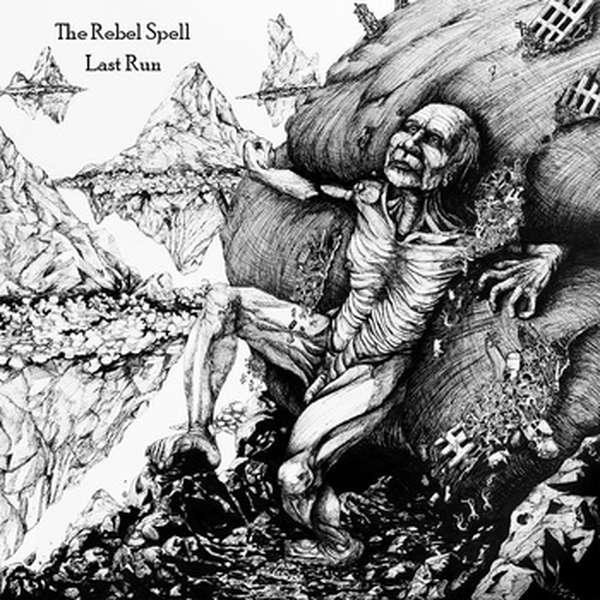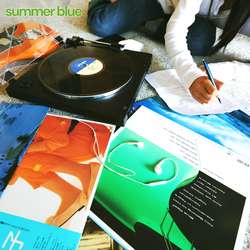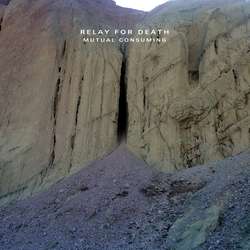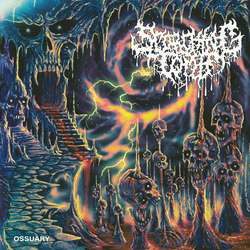In many ways The Rebel Spell’s Last Run is a depressing album. The cover art depicts a feeble, aging anthropoid trying desperately to hold back an immense industrial wave. It’s clear that he won’t be able to stand his ground for long. The album title itself can be interpreted as an ominous prediction for the fate of our civilization. And vocalist Todd Serious’ opening lines set anything but an optimistic tone for the album:
There’s a deep deadly silence sadness growing inside of me, it hurts to be here but I can’t leave.
It could be easy, for some listeners, to become overwhelmed or disheartened while listening to Last Run. But engaging tough realities is something The Rebel Spell have been doing for three full lengths previous to Last Run, and there is a reason the band is still at it.
Musically, Last Run is a melodic, cleanly produced street punk album. The album starts fast, and maintains the pace for most of its length. The rhythm section is relentless and tight from start to finish, drums and bass guitar coalescing in a way that makes it hard not to pump your fist, and nearly impossible not to bob your head. Rhythmically, there is no new ground being broken on the record. Listeners looking for something more progressive may be let down by the straight ahead punk beat which prevails on Last Run. The Rebel Spell are certainly not trying to be something they're not. The territory is familiar, but it is executed flawlessly.
The biggest difference between Last Run and The Rebel Spell’s previous releases is probably producer Jesse Gardner’s handling of Erin’s guitar parts. This might be the fullest, most dynamic guitar sound that The Rebel Spell has achieved on a release to date. The balance between cleanliness and abrasiveness on any punk album is always a delicate thing to achieve, and it is struck with remarkable accuracy here. Erin’s crunchy hooks blend seamlessly into haunting, meandering melodies made even more impactful by bass player Elliot’s addition of organ and piano to a few of the songs. The multi-instrumental aspect is not overplayed, but it is one of the characteristics of the album which distinctly sets it apart from conventional street punk.
Vocalist Todd Serious’ delivery on Last Run is in many ways similar to Erin’s guitar work, and the dynamic between the two is one of the things that has defined The Rebel Spell as a unique and relevant band since their first release, 2003’s Expression in Layman’s Terms. Todd’s vocals are aggressive and clean, melodic and punchy, and just like Erin’s guitar, very haunting. It’s not easy to maintain an abrasive vocal sound in heavy music without venturing into screaming territory, nor is it simple to create a unique vocal sound without assuming an unnatural or contrived tone, but Todd’s direct approach is extremely effective at achieving this. The emotion in the vocals is palpable, without sounding sappy. The lyrics are easy to make out, and this is of outmost importance to a band with a message and an agenda like The Rebel Spell. You can tell Todd is angry from his first notes, and it is easy to accept this anger as genuine.
One of the standout tracks on the album is "The Tsilquot’in War," which is the album’s longest, clocking in at over 5 minutes. The lyrics take the form of a linear narrative, telling the story of a violent uprising in northern British Columbia by a group of indigenous warriors in the 1860s. The warriors opposed the building of a road through their traditional territory and the implications of disease, abuse and violence which was carried with it. Unable to defeat the guerilla warriors, and suffering overwhelming casualties, the white settlers lured the Tsilquot’in into their camp with the promise of peace talks. When the warriors arrived, they were tried and convicted for murder and hanged. Todd’s repetition of “We meant war not murder” towards the end of this song is one of the most striking and powerful moments of the album. The song also features vocals and fiddle accompaniment by folk artist Jeff Andrew, another genre-defying moment on Last Run. "The Tsilquot’in War" is twelfth of thirteen total songs on the album. Personally, when a band can pull off putting a standout track at the end of the album, I feel this speaks volumes for the quality of the album as a whole.
Some people might listen to the lyrics in Last Run and dismiss them as contrarian or idealistic. Likewise, some people might listen to the record and write it off as a generic punk album with nothing new to offer. But if you listen a little harder, you can find the hope, compassion, and realism in the lyrics. It’s right there for those who are receptive to it. Likewise, if you listen for the musical nuances, you might be able to tap into the poetry of The Rebel Spell and understand what sets the band apart. You might even come to understand The Rebel Spell as a sonic representation of the immutable rage of the human spirit. The Rebel Spell might be one of those bands that either touches you profoundly, or doesn’t do much for you at all. Regardless, Last Run is as good an offering from the band as could be hoped for, and possibly their best to date.



